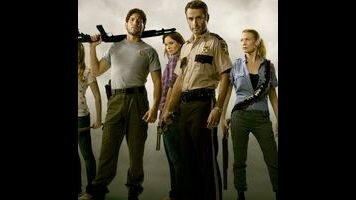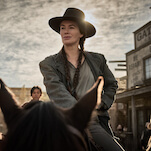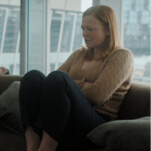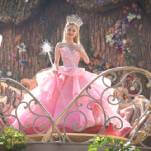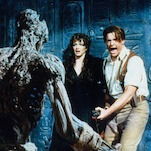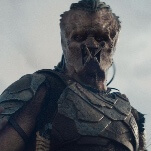Here’s how abuse works: you don’t just hit them because you can. I mean, yeah, you do—and you hit them again, and again, and you find new ways to hit them, until the only time they really feel comfortable is when you’re hitting them because at least then they know what’s going on. But the trick is to convince them they deserve what they’re getting. Everyone wants to believe they’re in control of their situation, that the actions they take will protect them and the people they love. Everyone wants to believe they can stand up to the monsters trying to keep them down. So what you do is, you twist that. You take every opportunity to remind your victim that every punch, every slap, every kick, every sneer and stab and drop of blood, is a direct result of their own willful disobedience. You bear down and you smile like you’re a reasonable man, and you lie through your teeth. You tell them that it’s their fault for having a soul, and you keep cutting off pieces of what they have left until they believe it. The hitting is the fun part, but it’s not the part that stays with them. It’s the silence afterwards that lingers.
This is this point of “Service.” We’re back in Alexandria, and Negan shows up a few days early with a horde of Saviors; his people loot the town, and Negan goes back to educating Rick on his place in this brave new world. It’s an extra long episode that takes its time to wallow in the humiliation. Rick, who had for so long prided himself in his ability to take charge, to keep the people around him safe, to make hard choices in a hard world, is essentially impotent. Negan even gives him that damn baseball bat to hold. Various characters offer expressions of resistance, and Rick repeatedly, desperately, talks them down. He’s a broken man—or rather, he’s a man who’s willed himself to breaking. The anger is still there, but it’s inconsistent, mercurial. He’s never been the most consistent of characters, but now he’s committed himself to toeing the line, and it’s killing him by inches.
Which is powerful stuff, in theory. But this is an extra long episode, which means there’s too much air in it; too many opportunities for Negan’s sub-Joker act to deflate the tension, too much time spent on Rick’s tortured, sweaty features. There’s dramatic energy in the core concept here—unpleasant, brutal, and deeply depressing energy (especially after the events of this week), but energy nonetheless. But the show is squandering it in its efforts to convince us that no, this time things really are different. All those threats in the past that Rick and our heroes struggled against? Those were bad, sure, but they’re nothing compared to this. Negan is a new thing, so we should all forget the times before when the heroes eventually survived, and be scared that nothing will ever work out well again.
The problem is, this is an ongoing series, not a one-off movie, and while I’m sure we’re in for plenty of dark times ahead, Negan isn’t going to be the conclusion to the story. Not because the show has much optimism about the future of humanity, but because there are only so many narratives we can tell about this dude; eventually his antics will either be incorporated into the status quo, or he’ll be defeated. That’s how Big Bads work on serialized television. While the gloom and despair that lies at the heart of The Walking Dead’s worldview is probably never going away (it’s astonishing, really, how a narrative whose main point seems to be the ultimate futility of hope is so popular; maybe Beckett should’ve thrown some zombies into Waiting For Godot), it can’t forego dramatic arcs all together.
So we get what we’re seeing now: a new villain, and a new effort to wipe the slate clean and trick us into believing that this time, maybe things really will collapse. Which is ridiculous, but usually it works because the audience is willing to buy into the model. We want to keep caring about this story, and we want the charge that comes from being scared by some terrible person or threat; so we accept that, okay, even though we know this is being written by people who can’t completely tear their world down, and even though we know that sooner or later, Rick will rise again, maybe this time things really are that bad.
The cracks are showing here, though. For one thing, “Service” is too long, especially for an episode which is largely the same note played over and over again. Yes, there’s a brief subplot for Michonne and a slightly more developed one for Rosita, but the majority of the running time is given over to Rick’s complete submission to Negan’s demands, and his desperate attempt to hold things together when it looks like someone in Alexandria isn’t playing by the new rules. On a functional level, this is probably a necessary reminder that the Rick we saw that the end of the premiere hasn’t gone away. Watching Abraham and Glenn brutally beaten to death, and knowing that both beatings were, in a sense, a result of his own rash decisions, has had its effect. He’s now stuck in placating mood.
This should be unsettling—half of what makes a bad guy effective is how other characters react to him or her, and the way Rick seems split between exploding with rage and cowering in terror every second Negan’s on screen is impossible to miss. And Negan’s insistence on taking all the guns is a smart choice, because it makes our heroes more vulnerable in a very real, very immediate kind of way. But the whole dynamic is an overshoot, just like so much of what we’ve seen with Negan and the Saviors so far this year. The balance between building up a threat and then delivering on those expectations has been miscalibrated, so instead of unbearable suspense, we get an hour of nothing much. Yeah, there’s some moderate suspense that Negan might kill someone (although, no hard feelings towards Olivia or anything, but her death wouldn’t have been much of a shock), but after seeing Glenn get offed, the surprise factor is lost. That was the show’s big ticket moment, and thanks to some bad structural decisions, they blew it. And we’re stuck with this storyline regardless.
Another problem is that I’m still not sold on the Saviors as the perfect monsters the show makes them out to be. The shift is too sudden, too total. We went last season from a bunch of arrogant jack-asses buzzing around the edges of our heroes’ lives to an army of infallible killers, and the change is so clearly dictated by the needs of the narrative that it’s hard to buy into to any of it. In order for Rick’s capitulation to work, we need to believe that he has been so thoroughly terrified and scarred by recent events that his natural inclination to resist has been, at least for now, subsumed in his efforts to toe the line. We need to feel like he’s been wrecked by an abuser so powerful he’s nearly supernatural, and it’s just not happening. Part of that’s the writing, part of its Jeffrey Dean Morgan (who doesn’t have the imposing physicality needed to make this role come even close to working), and part of it’s just that the show has put itself in an impossible position.
After so many years of watching our heroes struggle and lose friends and build up hope only to lose it again, there’s no novelty in seeing that arc play out once more. It might have worked if Negan had some nuance to him, if there was more moral complexity to the Saviors—if this wasn’t simply another iteration on “humans are the real monsters.” And it’s still possible that this could develop into something more interesting over time. But for right now, in its efforts to drive home just how awful everything has become, the show has gone from borderline reprehensible to simply boring.
There are a few bright spots here. While Rosita’s efforts to get a gun, and her request at the end for Eugene to make her a bullet, aren’t really exciting, at least it offers something different than Rick’s repeated demands to the other Alexandrians to roll over and play dead. (Given that Rosita has never been a major character on the show, and that we’re almost certainly going to see some more familiar faces get offed before the end of the season, it seems like all she’s really doing here is signing her own death warrant, but we’ll see.) And it was good to see Michonne getting some screentime again, however limited. Her discovery of the burnt pile of Alexandrian goods—looted by the Saviors for the sole purpose of showing everyone they could—was probably the best part of the episode, at least in terms of showing us who these people are.
Plus, at some point we’ll get back to the Kingdom, and Carol and Morgan. And hey, the fact that Rick was willing to pretend the Maggie’s dead at least offers some hope that he hasn’t completely given up. Rick isn’t much of a character anymore, if he ever was; his speech to Michonne that tries to justify his behavior by talking about the fact that he knows Judith isn’t his biological daughter is bizarre, and does nothing to clarify anything. Nor does Negan’s earlier efforts to bait him with evidence of his previous, more aggressive self, make a lot of sense. Rick never went soft. That was the whole point of the Alexandria arc, if there was a point; the town didn’t remake him, he remade the town, and nearly destroyed it in the process.
But if this is heading towards Rick kicking ass again, by all means, let’s get there soon. Abuse can be a powerful dynamic in fiction, but when it’s mishandled, it becomes an exercise in tedium—if we can’t empathize with the victims anymore, it’s just a slog towards a hopeful revenge.
Stray observations
- Spencer is an ass, isn’t he?
- Father Gabriel’s speech about how he believes everything will turn out all right definitely didn’t feel like it had any real world parallels at all. (I’ll be honest: this episode was a tougher watch this week than it would’ve been last week.)
- Carl is terrible. Just terrible. He and Spencer should go on a road trip where they drive into the ocean.
- There really was no reason for this one to run as long as it did. Not sure if a shorter version would’ve made it good, but it might not have felt quite so airless.
